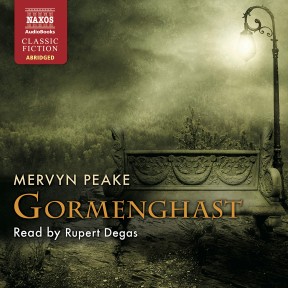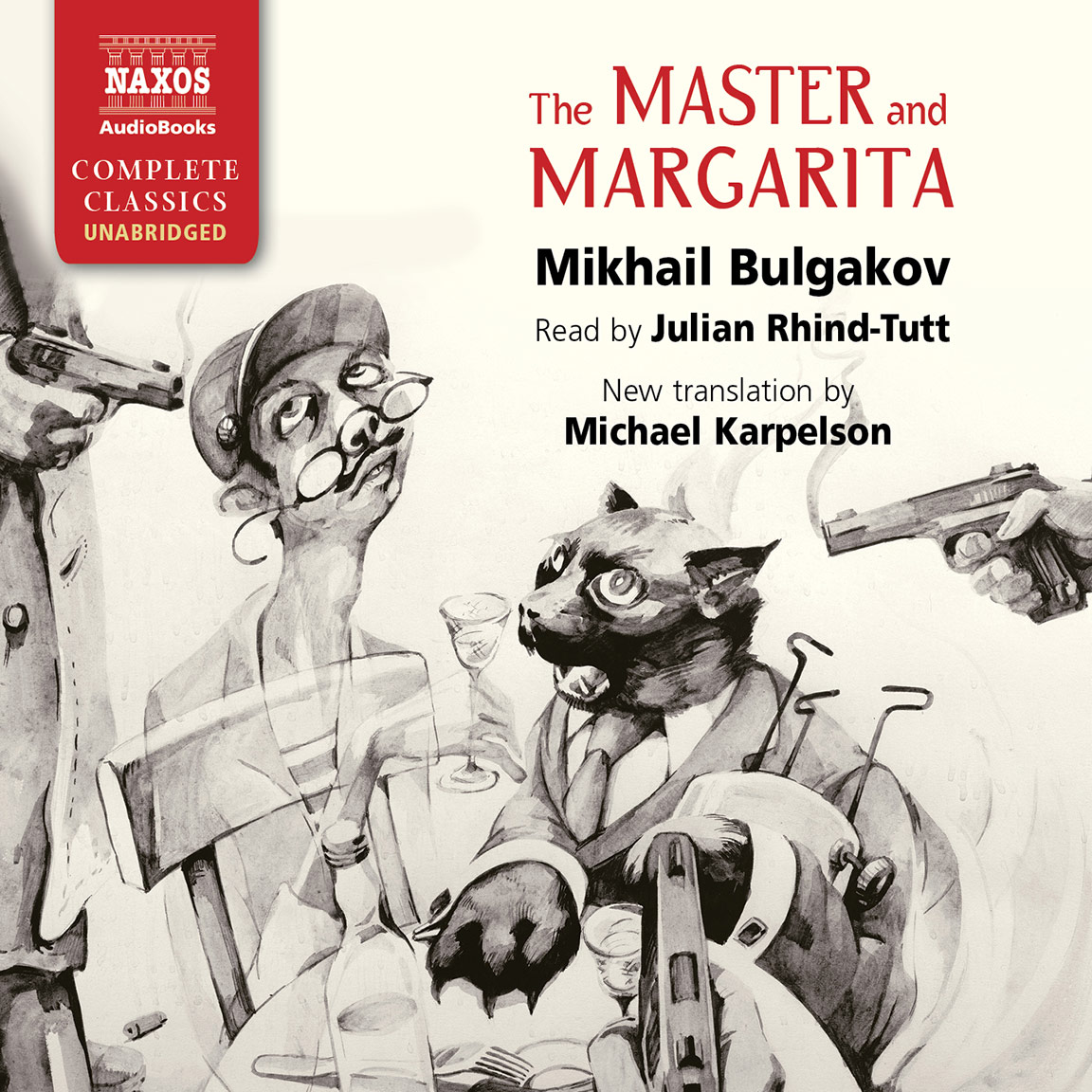
Audio Sample
Mervyn Peake
Gormenghast
Read by Rupert Degas
abridged
Titus, Earl of Groan, is becoming aware of a world beyond the suffocating confines of Gormenghast, bound by centuries of tradition into a pattern of decaying rituals. He yearns for freedom. Meanwhile the amoral Steerpike continues to forge his way into a position of power, leaving death in his wake and nearly dying in the process. But his rise places him at odds with Titus himself; and only one will survive. This award-winning sequel displays all of Mervyn Peake’s imaginative brilliance in creating and sustaining the extraordinary world of Gormenghast.
-
Running Time: 4 h 50 m
More product details
Digital ISBN: 978-1-84379-539-1 Cat. no.: NA0062 Download size: 70 MB BISAC: FIC009000 Released: April 2011 -
Listen to this title at Audible.com↗Listen to this title at the Naxos Spoken Word Library↗
Due to copyright, this title is not currently available in your region.
You May Also Enjoy
Reviews
Clear distinctions between good and evil are so rare in real life, that it is sometimes comforting to know whether to cheer or hiss at a character before you have heard more than a few lines about them. Gormenghast, the second in a series of three gothic novels by writer Mervyn Peake, draws such a clear line between the righteous and the damned that the listener knows which is which when they hear their names: from the malevolent, power-hungry and cunningly manipulative Steerpike, to Dr Alfred Prunesquallor, the smart-aleck doctor of Castle Gormenghast. Even the name of the castle calls to mind how it is later described: dark, dank, foreboding, with many hidden passageways for hiding wrong doing. The family who lives here, and the hero of this tale, are aptly named Groan: there is Titus, who is seven when Gormenghast picks up, and is the reluctant heir to the throne; Fuschia, his spoiled sister, who like her name comes off as a bit too garish; and their deceased father Lord Sepulchrave. Gormenghast follows Titus as he comes of age and must decide whether to indulge in his desire to shirk obligation and make a life outside of the castle, or to be the much-needed hero and save this ancient, secretive and frankly weird world from a terrible end.
The listener’s appreciation for the clear demarcation between good and evil is also brought into sharp focus by narrator Rupert Degas’s exceptional reading. Degas displays a wide range of accents, vocalizations, and tones, from somber, when he is describing the foreboding castle, to wild and agitated, such as in the final scenes, which are filled with an appropriate showdown between the forces of good and evil, now evident to all the colorfully-named characters. Many male narrators often have difficulty depicting women, since too high a pitch can sound like mockery, while too low can erase any difference between male and female voices. Degas has no such trouble: his vocalization is so expressive and varied that he is able to actually lower his pitch for a female character, such as the Countess Gertrude, Titus’ mother, who is an imposing but largely reclusive woman until disaster requires her assertive leadership; or raise it when depicting the squeaking laughter of Dr Prunesquallor. Gormenghast is abridged and the second in the series, but its simple themes and straightforward plot meant that these factors did not draw away from this colorful work of fantasy.
Joanna Theiss, SoundCommentary
Gothic and sprawling, the ancient castle Gormenghast is the centrepiece of a kingdom cloistered in intrigue and dark rituals. Titus Groan, the kingdom’s 77th earl, and his mother and sister, are the castle’s prisoners. Titus is seven years old. So opens this second volume of Peake’s titanic and sublimely ornate Gormenghast trilogy. Narrator Rupert Degas not only reads the heightened prose with focus and energy, he also makes the entire book more easily accessible by creating distinct and memorable character voices. As Peake practically paints with language, Degas faithfully weaves the poetic colours, shadows, and textures. Peake was a contemporary of Tolkien and a strong influence on the young George Lucas. This abridged reading is an excellent introduction to Peake’s enduring creation of high fantasy.
B.P., AudioFile
Booklet Notes
The Gormenghast trilogy (as Titus Groan, Gormenghast and Titus Alone are slightly inaccurately known) seems at first sight out of step with its times. The first volume was published in 1946, when a numbed Britain was greyly austere, still in shock and just beginning to learn some of the broader horrors of the War: the devastating implications of the atom bomb were almost overwhelmed by the emerging atrocities of the Holocaust. Titus Groan, a grimly comic, fantastical, Gothic tale, was surely just an escapist work, a kind of dark relief. But while the imaginary world it so completely describes is essentially self-contained (rather than echoing the concerns of Britain in the ’40s), Peake had more claim than most to an understanding of the evils in the real one. He had been a war artist at the liberation of Bergen-Belsen.
He had also suffered the first of two nervous breakdowns, and was by temperament slightly otherworldly. He was the son of missionaries – his father a doctor, his mother a nurse – and spent his early years in China before returning to England to complete his education in 1923. Tracing specific influences is bound to lead to conjecture, but his imagination was certainly stirred by the architecture and the unquiet society of China at the time, and his first published story was written when he was 10 for the Missionary Society’s magazine.
Passionate, unconventional, romantic and almost in some senses wild, he had worn a cape, an earring and his hair long in the early ’30s when he was pursuing his first love (art) and his second (poetry). Despite his evident skills he was undisciplined almost on principle, and after failing the necessary exams at the Royal Academy Schools he moved to the Channel Island of Sark, where a former tutor had established an artists’ colony. His work was exhibited there and in London, where in 1935 he returned and began teaching at the Westminster School of Art. He met Maeve Gilmore on her first day as a student there and they married the following year. By the end of 1940 he had had a one-man show in London, illustrated a collection of children’s verse, written and illustrated a children’s book, had a son, moved to Sussex, and begun the writing of Titus Groan.
He had also joined the Royal Artillery, although he was a good deal more interested in becoming a war artist. His several applications to become one were turned down in part because it was suspected that he might be applying in order to get out of the Army. It would not be an unseemly speculation to suggest that this was correct; but his mental state was such that he was invalided out of the Army anyway after a nervous breakdown in 1943.
After six months’ recovery, he was finally taken on as a war artist, and at the end of the War witnessed Nazi trials as well as the previously unimaginable concentration camps. As an artist he had always been attracted to the macabre, but this actual horror changed him deeply. His wife said that he became ‘quieter, more inward looking, as if he had lost his confidence in life itself’. His other work during the War included illustrating The Hunting of the Snark, The Rime of the Ancient Mariner and Dr Jekyll and Mr Hyde, writing more poetry, and finishing Titus Groan. He and his family went to live in Sark in 1946 (the year of Titus Groan’s publication), in the house previously occupied by the Commandant of the German occupying force; but financial constraints forced them back to the UK in 1950, where Peake taught, illustrated, published Gormenghast, and wrote a comic novel (Mr Pye) and several plays. But the plays were not the financial winners he had hoped for, and he suffered another nervous breakdown in 1957. This led to the more evident display of the symptoms of a type of Parkinson’s Disease which, alongside the effects of encephalitis lethargica that he contracted in childhood, was slowly to kill him over more than a decade. In 1956 he wrote Boy in Darkness, a short horror story about Titus (although the name is not mentioned in the book), and in 1959 Titus Alone was published. By now, however, Peake was hardly able to write, and Titus Alone was incomplete on publication. Later editions were corrected by his widow and the writer Langdon Jones. Preparatory notes for a further volume (Titus Awakes) were also discovered among his many papers after his death.
Gormenghast
This second book in the series starts with Titus at seven, and finishes with him at 17. Inside Gormenghast, the old ways are facing a threat that seems as organic as it is destructive. Just as Steerpike’s rise in Titus Groan was a harbinger of unwelcome and not necessarily beneficial change, so his continued prominence directly and indirectly threatens lives, and is evidence of a shift away from the rooted traditions of the castle.
He doesn’t have it all his own way, though, and faces genuine threats to his own life on several occasions as his plotting destroys more and more of the crumbling world of the castle. But in determining his own rise to power, Steerpike is setting himself against his Lord, Titus, who feels trapped and oppressed by the rituals of his position. Gormenghast also moves the focus away from the castle itself and into the wider world – the world of Titus’s schooling, the world inhabited by his foster-sister, feral and free, The Thing; and by extension the world in general beyond the confines of the narrow expectations to which he was born.
This second novel increases the incident and surprise (of both delight and tragedy) without losing any of the extraordinarily complete imagining of Peake’s invented world. There are fires, lightning strikes, floods and dramatic departures. But there is a new element, too: a greater openness, or even joyousness, expressed in part in the way the story moves into new country, but also in the language itself. This was perhaps born from the fact that it was written during his happiest years, in Sark after the War. This, added to the uniquely strange atmosphere he created and maintained, earned the novel the Royal Society of Literature’s Award and the Heinemann Award for Literature, which also recognised a collection of Peake’s poetry, The Glassblowers. He may never have received the public acclaim he needed for financial security, but the critics were recognising something that would eventually become the stuff of cult legend and huge popular pleasure.
Notes by Roy McMillan




